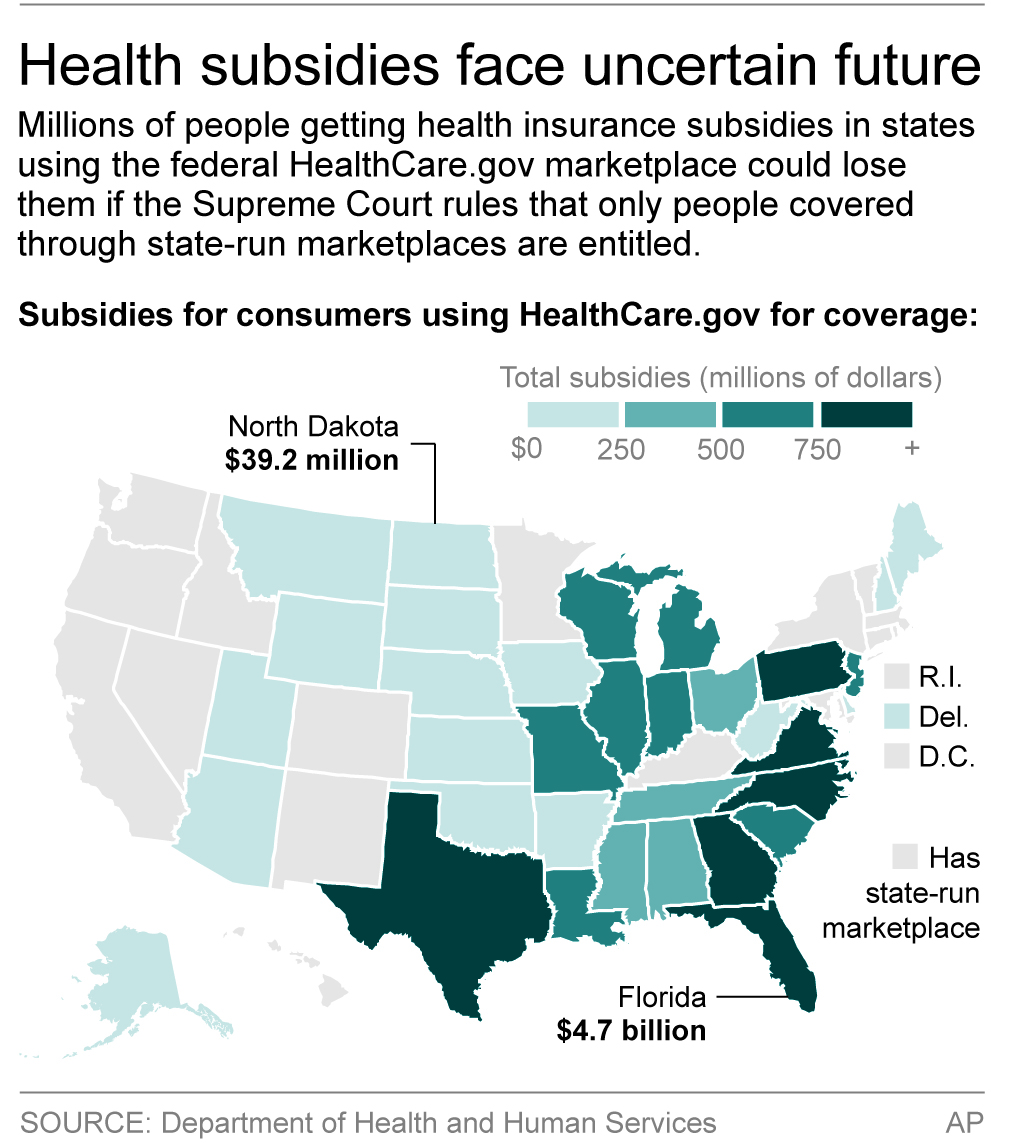Millions of Americans could lose Obamacare subsidies under a Supreme Court ruling this month, but many in the GOP don’t need their votes anyway.
That’s a major political calculus for Tea Party Republicans, who are likely to resist any efforts to extend the subsidies, even temporarily. They’re much more worried about angering their base by appearing to concede to Obamacare than whether a handful of constituents lose their subsidies.
“Ninety-seven percent of Americans aren’t receiving those subsidies,” Rep. Austin Scott, R-Ga., told reporters Thursday. “I will tell you I’m a ‘no’ on voting to extend those subsidies unless the president is willing to sit down and work with us and fix the problems for that 97 percent.”
At stake are federal subsidies that about 7 million low and moderate-income Americans are using to buy health coverage.
They could lose the assistance if the justices rule the Obama administration is awarding it illegally in the 37 states relying on healthcare.gov instead of running their own insurance marketplaces. The dispute, known as King v. Burwell, is over the interpretation of a few sentences in the Affordable Care Act.
Many leading Republicans in the House and Senate are backing or working on plans to keep the subsidies flowing temporarily, saying it’s unfair to allow Americans to suddenly be deprived of federal assistance they were relying upon to buy health coverage.
But it’s highly doubtful whether they would be able to get any plan through Congress. Heavy resistance is likely to come from House members on the Right, who are far more worried about GOP primary challengers than about Democratic ones. These members tend to represent conservative districts where they don’t need support from low-income voters or minorities.
“The vast majority of folks taking a hard line are in districts where they’re going to be perfectly safe on that,” said Republican pollster Wes Anderson.
Only about 1.9 percent of his constituents are receiving Obamacare subsidies, said Rep. Tim Huelskamp, a Kansas Republican who is a frequent critic of party leadership.
“I can vote with the 98.1 percent — I usually win the election that way,” Huelskamp told the Washington Examiner. The political influence of Americans receiving subsidies is “vastly overestimated,” he added.
Anderson agrees, saying his internal polling shows Republicans won’t hurt much politically if they don’t extend the subsidies. But he acknowledges that the GOP could still hurt itself in the blame game that would result should the court uphold the King challenge.
“It’s going to quickly devolve into ‘who is responsible for this mess and who’s responsible for cleaning it up,” he said.
Compared with the House — where members represent districts often rendered relatively homogenous by gerrymandering —GOP senators have somewhat different considerations. More of the Senate members’ constituents stand to lose subsidies, especially considering the states not running their own exchanges are disproportionately in the red South.
Reflecting that reality, Republicans in the Senate are more unified in backing various plans to extend the subsidies for a while. Thirty-one have signed onto a bill backed by Sen. Ron Johnson, R-Wis.
Sen. James Lankford, R-Okla., isn’t one of them. But he still says Republicans should strongly consider preserving the subsidies.
“In my state we had Ensure Oklahoma, which Obamacare killed,” Lankford told the Examiner. “And so those folks that already had what our state was providing were thrown into a federal policy and are about to get thrown out again … We do have a lot of people who were affected with no action on their own.”
If Republicans manage to coalesce around a plan, it likely would have to repeal other parts of the healthcare law — like its individual and employer mandates — to win enough support from the right. President Obama would almost surely veto such a measure, but it could give Republicans political cover next year if Democrats blame them for allowing the subsidies to end.
But none of those steps are guaranteed. While members such as Huelskamp and Scott are adamantly against extending the subsidies, other conservative members say they’re still making up their mind. Tennessee Rep. Phil Roe said he hasn’t reached a decision. Nor has Texas Rep. Bill Flores, chairman of the Republican Study Committee, a group of about 170 conservative Republicans.
“If you ask all 170 of us, you probably would get half a dozen different opinions,” he said.

